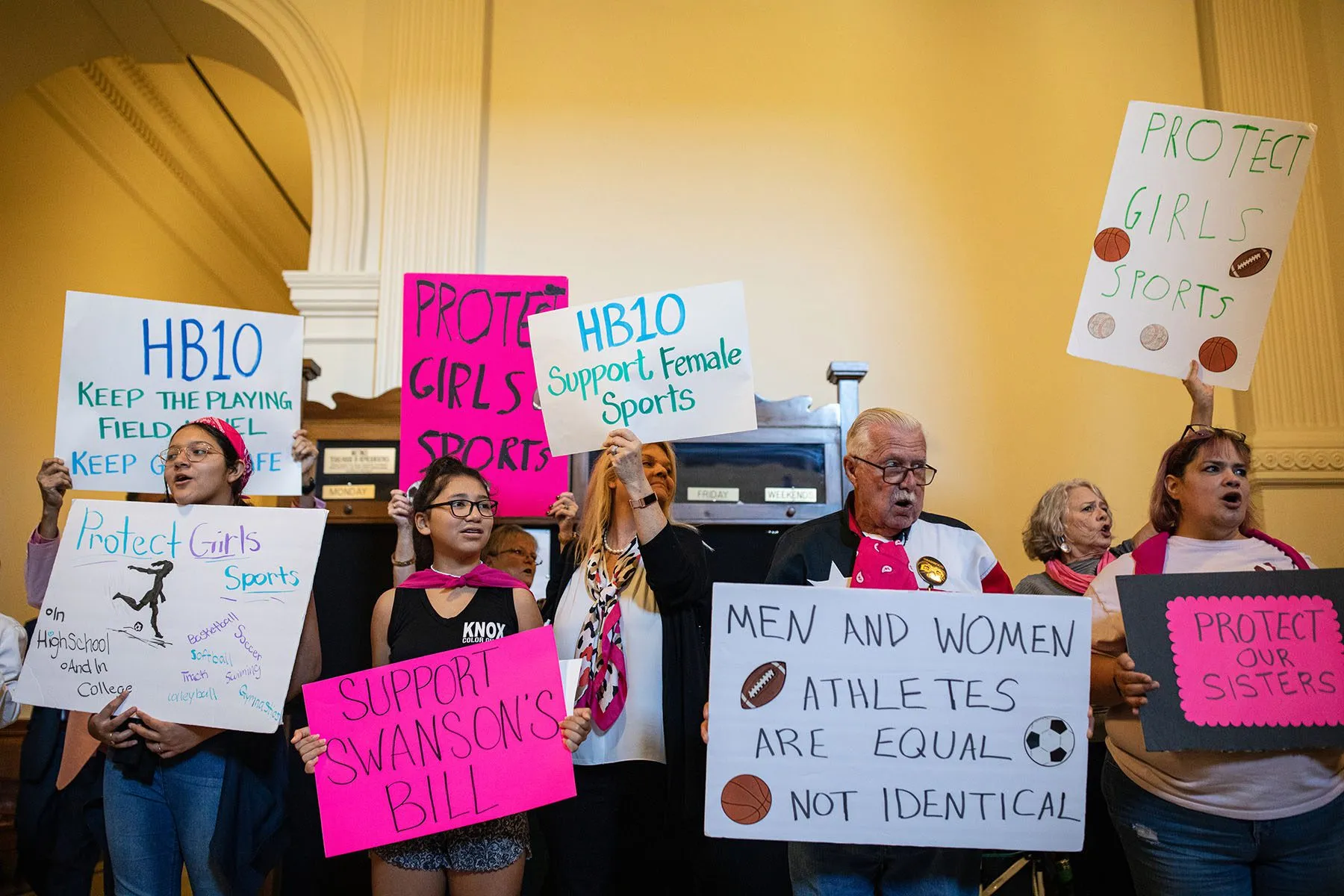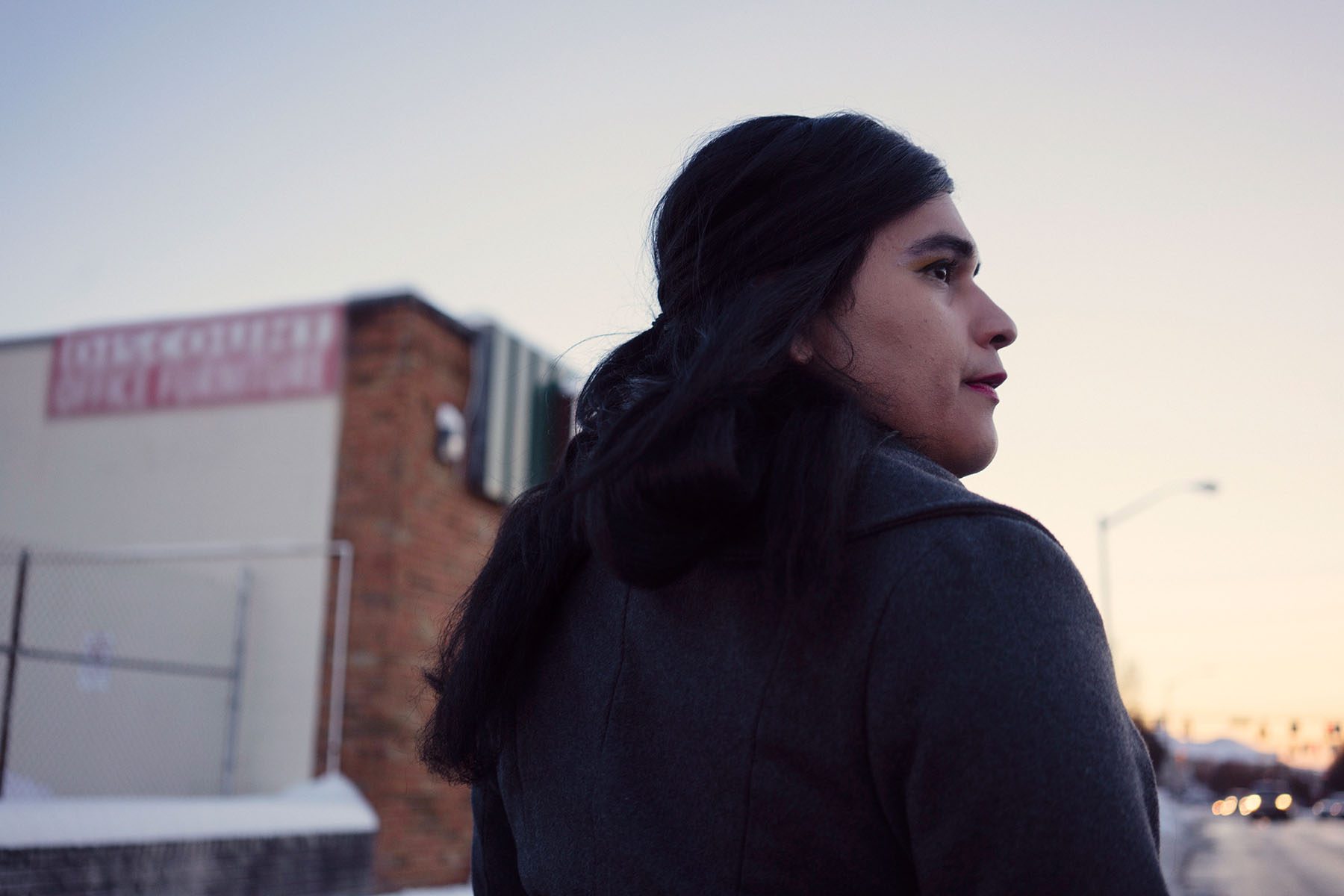Many LGBTQ+ youth reported high stress, anger, sadness and fear for the future at the end of 2021, and reported struggling to access basic needs during the pandemic, according to a new online poll published Monday by Morning Consult and LGBTQ+ youth crisis organization the Trevor Project.
Much of the stress and sadness was caused by the record number of bills introduced last year aiming to restrict transgender kids’ ability to play sports at school or access gender-affirming care. Two-thirds of the surveyed LGBTQ+ youth, all aged 13 to 24, said debates surrounding anti-trans bills last year negatively impacted their mental health. Among the trans and nonbinary youth surveyed, 85 percent said their mental health suffered, with 37 percent saying the effect was severe.
“To have two-thirds of kids say that is shocking and something we should really pay attention to,” said Ryan Watson, associate professor at the University of Connecticut who has researched the experiences and health risks facing LGBTQ+ teenagers.
Experts, as well as advocacy groups PFLAG and the Trevor Project, are worried that the mental health consequences for LGBTQ+ kids and young adults — especially trans youth — will continue or get worse as more bills are introduced in 2022 and as policies start playing out in schools.
At least 12 new anti-trans bills have been filed across seven states this month as 2022 legislative sessions kick off, not counting states like Arizona and Hawaii, where 2021 bills are being carried into the new year’s session. The bills, introduced in states that pursued the same efforts last year, again aim to restrict trans kids’ access to gender-affirming care and their ability to play on school sports teams that align with their gender.
Several bills also propose additional restrictive steps not seen in 2021. Oklahoma and New Hampshire are pursuing new efforts this year to restrict bathroom use or add stipulations about biological sex to state birth certificate laws.
“What we are concerned about is that, having achieved a measure of success with these sports and health care bills, that the advocates of those anti-trans legislation are now seeing an opportunity to build on that,” said Casey Pick, the Trevor Project’s senior fellow for advocacy and government affairs.
South Dakota Republicans have introduced a bathroom bill that goes further than the state’s 2016 bathroom bill by allowing any student to sue a school district if they encounter a member of the opposite sex — as determined by biological sex instead of gender identity — in any changing room or bathroom, or if the school allows students of another gender to use the same sleeping accommodations.
Multiple states, including Arkansas, Mississippi, West Virginia, Montana and Florida, that successfully passed bills to restrict trans kids’ sports access in school last year included a similar clause to allow students to take legal action against their school if they feel they are being deprived of athletic opportunities due to competing against a trans person. Lawmakers in many states have failed to provide evidence of trans competitors posing an issue.
In addition to a bill that would ban physicians from prescribing hormone therapy and puberty blockers to trans minors as part of gender-affirming care, Indiana has also brought an additional bill this month that would require physicians to tell the state how many of their patients are receiving gender-affirming care.
Abbie Goldberg, a clinical psychology professor at Clark University who has interviewed trans and nonbinary college students as well as LGBTQ+ families, said that trans youth grappling with a global pandemic and legislation targeting their lives are navigating personal threats on top of broader anxiety.
“They’re experiencing an undue amount of stress,” she said. “…‘What are people thinking of me, how do my neighbors feel about me?’”

Diego Sanchez, director of advocacy and policy at PFLAG National, said that he worries about poor mental health effects of anti-trans bills combining with other stressors caused by the pandemic. Issues already faced by LGBTQ+ people, like youth homelessness and food scarcity, have only gotten worse during the pandemic.
Half of LGBTQ+ youth told Morning Consult and the Trevor Project that not having enough money causes them stress or anxiety very often — and 35 percent struggled to afford the things they needed during the pandemic. Nineteen percent said they had experienced not having enough food during the pandemic. The margin of error for the survey is ± 3 percentage points.
Transgender kids and young adults reported significant challenges to accessing mental and physical health care last fall — as the United States rode out the Delta surge of the coronavirus pandemic — compared to their cisgender LGBTQ+ peers. Fifty-three percent of trans youth reported having trouble getting mental health care during the pandemic, and 30 percent struggled to access physical care.
Twenty-eight percent of the surveyed 820 LGBTQ+ youth polled from Sept. 14 – Nov. 5 last year said that they were very stressed about losing their housing, plus 26 percent who felt that way about losing their health care.
Studies have shown that discrimination, health care costs and a lack of access to finacial resources combine to keep many trans and nonbinary people in poverty long term — and for many LGBTQ+ people, it can be hard to even expect to have a future when you’re younger.
Trans youth experiencing poor mental health due to legislative debates over their rights could be facing a higher risk of self harm and suicidality, Goldberg said.
“That’s the unspoken but pretty obvious thing here, is that if you’re feeling not great about yourself, and you’re feeling angry, and you’re feeling pessimistic about the future, you don’t feel like you have a future,” she said. “No one has your back.”
“These bills have incredibly significant material consequences for individual human lives,” she added.
Measures against LGBTQ+ youth at the local level are also taking their toll. PFLAG and the Trevor Project are worried about potential negative mental health effects caused by school districts across multiple states banning Pride flags as a political symbol or banning books by LGBTQ+ authors, especially those that depict trans characters.
What’s happening inside school districts is a top priority for PFLAG in 2022, Sanchez said. School districts in states including Florida, Indiana, Missouri, Oregon, and Utah instituted Pride flag bans as early as last fall, around the start of the school year.
“We know this is coming up everywhere,” he said.
While the Morning Consult/Trevor Project poll did not ask how LGBTQ+ youth felt about book or flag bans, experts previously told The 19th that flag bans could have dire mental health effects for LGBTQ+ students as they look for signs of acceptance from adults while navigating their identities.
Amid what advocates see as a state-level attack on trans youth, there are opportunities for local decision-makers to take action.
Pick said that she would like to see health care providers and school counselors have access to competency training to understand challenges faced by LGBTQ+ people, she said, and school districts should help equip educators to respond to suicidality among students.
Mental healthcare providers should, at the very least, be knowledgeable about support systems in their immediate area to refer trans youth and adults to, and respect their trans patients’ pronouns and identity, Goldberg said.
For LGBTQ+ youth who are grappling with pandemic-related stress on top of legislation that targets them or people they know, especially trans youth, self-care should be a priority, she added.
“It’s really important to recognize when you’re approaching a burnout or emotional exhaustion threshold,” she said, especially as trans and LGBTQ+ youth engage in activism and stay on top of news that affects them.
For parents trying to support their kids, she recommends reaffirming their value and helping them find resources if traditional mental health avenues aren’t available — like mental health apps that can help them regulate their mood, searching for online support groups.
Whether or not anti-trans bills introduced and debated in 2022 actually pass, they still present a mental health stressor, she said — and people in the lives of trans youth should do what they can to support them.







